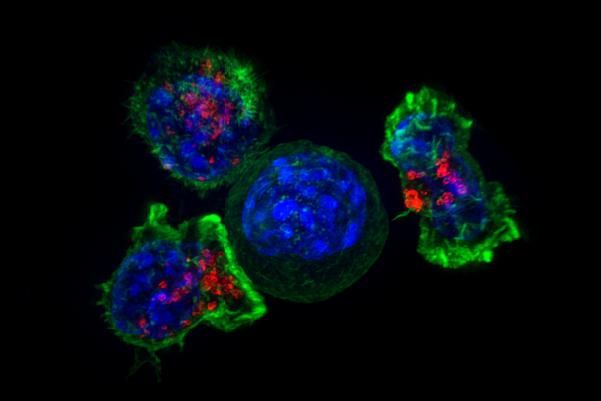Researchers at La Jolla Institute for Immunology (LJI) have demonstrated how cancer-fighting T cells can be engineered to clear tumors without succumbing to T cell exhaustion, a phenomenon that results in T cells giving up the antitumor fight after prolonged periods of overactivity. The newly reported findings demonstrated the key role of the transcription factor BATF in the cellular pathway that triggers T cell exhaustion, and showed how increasing levels of BATF in these cells boosts their cancer-fighting ability, with the help of another transcription factor IRF4. The results suggest a potential approach to increasing the effectiveness of CAR T cell-based immunotherapy against tumors, which is important because T cell exhaustion plagues even the most cutting-edge cancer immunotherapies.
“The idea is to give the cells a little bit of armor against the exhaustion program,” said LJI professor Patrick Hogan, PhD. “The cells can go into the tumor to do their job, and then they can stick around as memory cells.” The LJI team, headed by Hogan and LJI professor Anjana Rao, PhD, report on their studies in Nature Immunology, in a paper titled, “BATF and IRF4 cooperate to counter exhaustion in tumor-infiltrating CAR T cells.”
Fighting a tumor is a marathon, not a sprint. For cancer-fighting CD8+ T cells, the race is sometimes just too long, and they quite fighting. “CD8+ T cells that encounter antigen together with effective costimulatory signals mount strong effector responses that are able to clear pathogen-infected cells and tumor cells,” the team wrote. “In contrast, CD8+ T cells that infiltrate solid tumors and are exposed to prolonged antigen stimulation in the absence of adequate costimulation enter a hyporesponsive (exhausted or dysfunctional) state in which they do not effectively destroy tumor cells.”
To generate CAR T immunotherapies, researchers take T cells from a cancer patient and effectively “arm” them by altering the expression of genes that aid in the cancer fight. The engineered T cells are replicated in the lab, and then administered to the patient. CAR T therapies are different from other forms of immunotherapy that aim to activate the patient’s existing T cell population.
T cell exhaustion can emerge with both forms of treatment. “Many people have tried to use CAR T therapies to kill solid tumors, but it’s been impossible because the T cells become exhausted,” said study co-first author Hyungseok Seo, PhD, a former postdoctoral fellow in the Rao Lab.
For their new study the researchers aimed to address the problem of exhaustion by giving T cells the ability to fight exhaustion itself. To accomplish this, the researchers screened T cells to uncover which transcription factors could boost a T cell’s “effector” program, an important step in readying T cells to kill cancer cells. This screening process led the researchers to BATF, a transcription factor that they found cooperates with another transcription factor, IRF4 to counter the T cell exhaustion program. “The heightened effector response of BATF-transduced cells depends on BATF–IRF interaction,” the authors noted.
Their studies in mouse melanoma and colorectal carcinoma tumor models, showed that altering CAR T cells to also overexpress BATF led to tumor clearance without prompting T cell exhaustion. The CAR T therapy worked against solid tumors. “The anticancer effects were dependent on BATF–IRF interaction, since cells expressing a BATF variant unable to interact with IRF4 did not survive in tumors and did not effectively delay tumor growth,” the scientists pointed out. “BATF and IRF4 are cooperating to make T cells better,” said Seo.
Further testing showed that while IRF4 is important, it shouldn’t be overexpressed to the same degree as BATF. For maximum effect, BATF was overexpressed around 20 times more than in normal cells. Encouragingly, some altered T cells also became memory T cells. This is important because T cell exhaustion often prevents T cells from mounting a strong memory response to recurrent cancers. “Notably, some BATF-transduced CAR T cells remain after tumor clearance as memory-like cells that are fully capable of making a subsequent antitumor response,” the investigators stated. “Thus, BATF overexpression corrects the two cardinal features of T cell exhaustion: the immediate limitation on effector function and the long-term limitation on memory formation.”
“We didn’t just increase the ability of T cells to fight exhaustion—we increased the ability of cells to fight tumors,” said study co-first author Edahí González-Avalos, a graduate student in the Rao Lab who led the bioinformatic analysis for the project. Hogan thinks overexpressing BATF could be a promising approach for improving CAR T therapies and for tackling some hard-to-treat cancer types, such as pancreatic ductal carcinoma. These types of cancers are known as “immunologically cold” because they don’t spark a strong anticancer response from the immune system. T cells don’t fight them in force. Other laboratories have been exploring ways to make such cold tumors “hot,” so they will attract T cells.
The LJI team thinks a promising strategy would combine those approaches with targeting transcription factors to render T cells exhaustion-proof. “We wouldn’t necessarily need a transgenic approach to do this,” says Hogan. “Maybe even an oral drug molecule could do it, if you knew what transcriptional pathways you wanted to go after.”
The researchers emphasize that BATF is just one of many transcription factors that may prove important to manipulate when countering T cell exhaustion. “We’re going to keep looking for answers,” González-Avalos pointed out. As the authors noted in their paper, “Additional experiments will be needed to completely elucidate the transcriptional networks involved.” Nevertheless, they wrote, “From a therapeutic point of view, however, BATF overexpression in CAR TILs [tumor infiltrating T lymphocytes] has a markedly beneficial effect on both immediate and long-term antitumor responses, since it promotes the formation of long-lived memory cells that can control tumor recurrence … BATF may improve the antitumor responses of CAR T cells by skewing their phenotypes and transcriptional profiles away from exhaustion and towards increased effector function.”


